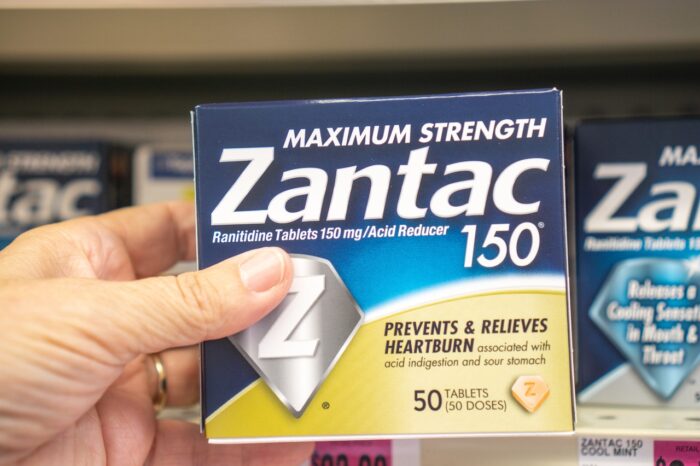Top Class Actions’s website and social media posts use affiliate links. If you make a purchase using such links, we may receive a commission, but it will not result in any additional charges to you. Please review our Affiliate Link Disclosure for more information.

Zantac Cancer Risk Class Action Lawsuit Overview:
- Who: Two plaintiffs have filed class action lawsuits against GlaxoSmithKline and other manufacturers of ranitidine-containing drugs.
- Why: The lawsuits say the drug makers concealed that Zantac and other ranitidine-containing drugs increased the risk of cancer for long-term users.
- Where: The Zantac class action lawsuits were filed in Pennsylvania federal court.
GlaxoSmithKline LLC knew that its blockbuster heartburn drug Zantac (ranitidine) could significantly increase users’ risk of cancer but failed to inform consumers about the risk, according to two recent class action lawsuits.
According to one of the Zantac class action lawsuits, “recent scientific studies confirmed what GSK knew or should have known decades ago: ranitidine transforms over time and under natural conditions into high levels of N-Nitrosodimethylamine (‘NDMA’), a carcinogen that is potent and dangerous.”
The U.S. Food and Drug Administration (FDA) reportedly recognizes NDMA as a “probable human carcinogen” and the World Health Organization has determined NDMA is “clearly carcinogenic.”
There is no medicinal purpose for NDMA, the Zantac class action lawsuit states. Its only purpose is to induce cancerous tumors in animals for research purposes.
Plaintiffs Tammy Smith and Golbenaz Bahtiar are long-time Zantac users who are asking the court to order GSK to provide medical monitoring to permit early detection of cancer for themselves and other Zantac users.
Analytical Pharmacy Discovers Zantac-NDMA Link
An analytical pharmacy reportedly ran tests on Zantac in 2019 and found that ranitidine is unstable and can break down into NDMA, especially when in the stomach. The pharmacy urged the FDA to recall all products that contain ranitidine.
The FDA ordered its own testing on ranitidine products and found “unacceptable levels” of NDMA in ranitidine products, including Zantac. In April 2020, the FDA called for a recall of Zantac and all other ranitidine products in the United States.
GSK Deceptively Marketed Zantac as Safe, Plaintiffs Say
The Zantac class action lawsuits allege that GSK knew of the risks posed by ranitidine but engaged in a decades-long campaign to hide that risk from consumers, misleading them into believing that Zantac was safe to consume.
GSK had a duty to ensure the safety of Zantac by properly manufacturing, testing, labeling, marketing and distributing the product and taking necessary steps to ensure consumers were not exposed to unreasonable and dangerous risks, the Zantac class action lawsuits argue.
As such, GSK had a duty to warn consumers about the cancer risks associated with ranitidine, but the plaintiffs say the drugmaker failed to warn about the potential Zantac cancer risks.
Further, GSK allegedly printed expiration dates on labels that went past the date at which the product would remain stable, potentially exposing users to even higher levels of NDMA, the lawsuits claim.
If GSK had properly disclosed the potential ranitidine cancer risk, the plaintiffs say they could have used alternative medication. Because GSK did not properly warn about a potential Zantac cancer risk, they were unable to avoid the increased cancer risk, according to the lawsuits.
Get a Zantac Cancer Recall Claim Review (links to paid attorney advertising).
The plaintiffs are represented by Tracy A Finken of Anapol Weiss, Robert C. Gilbert of Kopelowitz Ostrow Ferguson Weiselberg Gilbert, Michael L. McGlamry of Pope McGlamry PC and Adam Pulaski of Pulaski Kherkher PLLC.
The Zantac Cancer Class Action Lawsuits are Tammy Smith, et al. v. GlaxoSmithKlineLLC, et al., Case No. 2:22-cv-00316-MAK, and Golbenaz Bahtiar, et al. v. GlaxoSmithKline LLC, et al., Case No. 2:22-cv-00323, in the U.S. District Court for the Eastern District of Pennsylvania.
Don’t Miss Out!
Check out our list of Class Action Lawsuits and Class Action Settlements you may qualify to join!
Read About More Class Action Lawsuits & Class Action Settlements:















8 thoughts onGlaxoSmithKline Class Action Says Company Concealed Zantac Cancer Risk
My husband used this and he passed away April 29, 2019 from pancreatic cancer
I have been using daily since may 2019
Used this many times, please add me.
Used a lot. Add
I used this for years, Add me
I was prescribed Zantac for over 10 years.
Ive used zantac for reflux by prescription and over the counter.
I HAVE USED zantac AS A ACID REDUCER SINCE BEING DIGINOSED WITH ACID REFLUX ABOUT 5 YEARS AGO